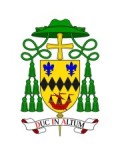Our Archdiocese
- Archbishop
- Bishop
- Vicar General & Episcopal Vicars
- Statistical Overview
- Boundaries of Archdiocese
- Organisational Structure
- Archdiocesan Assembly 2023-24
- Archdiocesan Plan 2016 - 2021
- History
- Coat of Arms
- Fifth Plenary Council of Australia
- Cathedral
- COVID-19 Position Statement
- Modern Slavery Statement
- Connect With Us

18th Sunday in Ordinary Time (Year B)
NAIDOC Week Mass
Homily
By the Most Rev Bishop Don Sproxton
Auxiliary Bishop of Perth
St Mary’s Cathedral, Perth
Sunday 1 August, 2021
Download the full text in PDF
A health balanced lifestyle is something that we try to construct for our very busy lives. Good nourishment, good exercise and sleep, good relationships at home and work are all we need for a sense of satisfaction and positiveness in our daily living.
Simply taking a walk in the early morning or after work has a remarkable effect on the body and mind. Getting some fresh air and walking in bush and the natural environment seems to rejuvenate the soul. There is a sort of healing that takes place, as well as the resting of the mind and emotions.
You could say that we humans have known the therapeutic value of reconnecting with nature and the earth for thousands of years.
The people who first came to our great south land have found that the land was like a mother, it gave food and pointed to how humans should live with each other and other creatures and the land itself. The land had stories to tell in its features, the hills, the water sources and the animals and birds. These stories were discovered by those Aboriginal and Torres Strait Islander peoples as they studied the land and its creatures. The stories enabled the people to connect with the forces that created nature and gave the people a way of finding the meaning of things and their place within the universe.
In our Christian times, the spiritual quest has been helped by great mystics and saints who found that the natural world was a kind of sacrament that points to the One who is responsible for all of creation.
St Francis of Assisi prayed in praise of our Lord for the beauty of the world, adding that our common home is like a sister with whom we share life, and a mother who opens her arms to embrace us.
“Praise be to you, my Lord, through our sister, Mother Earth, who sustains and governs us, and who produces various fruit with coloured flowers and herbs.”
The theme of NAIDOC Week is “Heal Country”. Aboriginal and Torres Strait Islander people have invited the entire nation to renew our care and respect for the land, and to listen to them as they talk about the healing they receive from their country. This healing occurs at so many levels for our brothers and sisters of the first peoples of Australia.
They can teach us much about how we can be healed spiritually, physically, emotionally, socially and culturally by regaining the art of walking with all other creatures towards God. And learning to hear God speaking through the creation. Creation points to God.
The Aboriginal and Torres Strait Islander people have received the knowledge about Jesus, as have all the people in every land on earth. They are joined with every other Christian and are our brothers and sisters because of their Baptism and initiation into the faith communities. We are all called to listen to the voice of the Spirit, especially in this privileged moment when we come together to celebrate the Eucharist.
St John retained for us the memory of the miracle of the bread and fish. With a very small number of loaves and fish, Jesus was able to provide for a huge crowd. But the point was not that he should satisfy their physical hunger alone, but that those who would listen to him should be able believe in him who has come to be their Bread forever. The Bread that gives eternal life is Jesus himself.
The miracle began with Jesus being with the people, listening to them and their needs. He responded to their physical hunger by feeding them. He, then, taught them about another kind of hunger, a much deeper hunger. This hunger is for understanding life, knowing how to interprete life events with faith, of how to move from self-interest to a greater vision of life and all in our lives.
Jesus offered the grace for those who witnessed the miracle to see him as the Son of God, who provides the food to nourish faith and the relationship with him.
This is what the Eucharist is: the food that will nourish our faith along the journey of our lives. If we believe in the One who the Father has sent, all the concerns of our lives will fall into their proper place and we will be able to see their meaning and purpose.
Our journey through life with Jesus Christ will be the most natural one we take. It will be like the refreshing and healing walk we take in nature itself. It will bring healing as we face the fear of looking into ourselves. It will be there that we will realise that will find God, loving us as we are and offering us the companionship to move beyond our self-interest to reconnection with life and the others with whom we walk in life.
